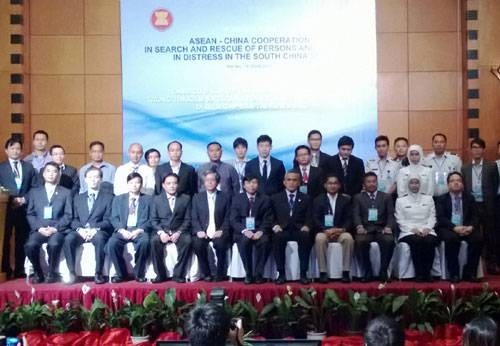(VOVworld)- Strengthening cooperation within ASEAN and between ASEAN and China in search and rescue in the East Sea is part of the Guiding Principles for implementing the Declaration of Conduct of Parties (DOC) in the East Sea approved in 2011. Amidst the current complications in the East Sea, ASEAN is pushing policies and cooperative measures for this humanitarian activity while building trust and enhancing peace, stability and order in the region.
The East Sea, which has provided livelihoods for nearby countries for thousands of years poses new risks to people and ships from its increasing traffic density. The East Sea is an important maritime route for two-thirds of all goods exchanged in the world. The number of offshore fishermen has increased but security and communication equipment has become outdated and insufficient.
 |
Photo: Nhandan daily
|
In recent years, ASEAN and China have organized a number of seminars and conferences to seek cooperation in maritime search and rescue and build mutual trust. They have discussed issues relating to less sensitive issues such as marine ecology and biodiversity research in line with the DOC. In June, Vietnam held an ASEAN-China seminar on search and rescue of persons and vessels in distress in the East Sea. Addressing the event, Deputy Foreign Minister Pham Quang Vinh said: " ASEAN and China have held a number of exchanges and seminars to enhance mutual understanding and discuss ways for further cooperation. The two sides discussed measures to build trust to better understand each other and seek appropriate measures to work together step by step. Meanwhile, overlapping for sovereignty claims must be resolved according to principles stipulated in the DOC”.
Through their joint efforts, ASEAN and China have reached consensus on several measures. They agreed to set up a list of key search and rescue agencies in the region, use English as the communication language, set up a hotline and a website to update information on ASEAN-China search and rescue, increase fishermen’s awareness and participation and take advantage of other civil forces like oil facilities for maritime rescue work. Mr. Vinh said it is important to adhere to certain key principles in order to make this work effective: “ First, the rescue work must be for humanitarian purposes. Persons and vessels in distress at sea, are innocent, so any rescue work is for humanitarian purposes. Second, involved parties need to share their policies to further coordination. Third, we must know the key search and rescue agencies to contact in each country in the region. Each country participating in this agreement needs to provide support for the rescue work. Finally, we need to develop a cooperation mechanism in the region”.
As a coastal country with a commitment to trust building and regional cooperation, Vietnam attaches importance to joint search and rescue efforts. Statistics show that in recent years, Vietnam’s success rate of rescuing fishermen in distress at sea is nearly 87%, and the rate for vessels is more than 47%, of which 50% were thanks to on the spot forces. This shows the importance of on the spot rescue forces, not only in Vietnam but also in other coastal countries.
ASEAN and China overcome multiple difficulties and challenge to sign the Declaration of Conduct of Parties in the East Sea and more recently, they approved the 6-point Principle Statement on the East Sea. They intend to quickly negotiate and sign the Code of Conduct of Parties in the East Sea. Cooperation between ASEAN and China in search and rescue is part of these joint efforts.